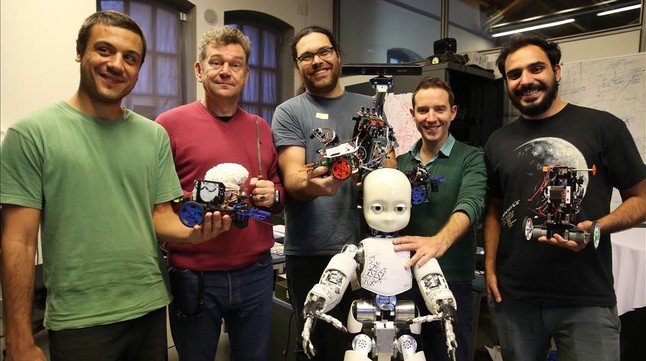Modelling the complex cognitive mechanisms of social behaviour through robotics
Such is the proposal of the project “Social interaction based on sensorimotor contingencies”, INSOCO, led by Martí Sánchez Fibla with the participation of Clement Moulin-Frier, members of the Synthetic Perceptive, Emotive and Cognitive Systems research group, thanks to a Spanish Ministry of Economy and Competitiveness grant.
“Social interaction based on sensorimotor contingencies” (INSOCO) is a line of research that belongs to the field of social robotics and has just started thanks to the Spanish Ministry of Economy and Competitiveness (MINECO) grants awarded in the 2016 call. Martí Sánchez Fibla is the principal investigator and is assisted by Clement Moulin-Frier. Both are members of the Synthetic Perceptive, Emotive and Cognitive Systems (SPECS) research group directed by Paul Verschure, ICREA research professor with the Department of Information and Communication Technologies (DTIC) at UPF. The project belongs to the “Excellence” category and will last for three years. The total amount allocated is 103,000 euros.

The main goal of the project is to model the social behaviour of individuals in order to apply it to robotics. As Sánchez Fibla states, “social robotics has two opposite conceptions regarding the origin of social cognition: top-down and bottom-up. In the first case, social cognition is the result of the interaction of agents based on complex predictive models about how the other agents will behave. In the second case, complex forms of social interaction are formed based on basic sensorimotor patterns that allow dynamic coupling between the agents”.
The INSOCO project will use both approaches as a starting point and will consider them complementary. It will be based on the theoretical experience developed in SPECS, of which Paul Verschure is its key player: the cognitive architecture of DAC, Distributed Adaptive Control, an approach that explains both low-level reactive behaviours, in general those aiming to satisfy the agent’s internal needs, as well as higher level cognitive representations. This theoretical perspective has a two-way, top-down and bottom-up structure, which makes it ideal for the project, in addition to never having been used in a social context.
In the course of the study, the INSOCO project will adopt, test and validate the initial hypothesis according to which social behaviour arises from the interaction (from down upwards) of the individual regulation of physiological needs and of the addition of sensorimotor learning processes of the agent. Hence, the agent produces high level resulting cognitive representations, which are then controlled top-down.
Thus, the INSOCO project aims to achieve the following goals: develop and model the necessary elements to generate social behaviour in agents: self-regulation and basic sensorimotor learning; integrate this behaviour in DAC cognitive architecture; prepare the technological components needed to build robot-robot and human-robot interaction scenarios; and, finally, design a casuistry and sufficient reference points to experimentally validate the initial hypothesis.
The resolution of the 2016 announcement of the Spanish National R&D&I Programme Targeting the Challenges of Society (Retos) and the Spanish National Programme for Fostering Excellence in Scientific and Technical Research (Excelencia), the Department of Information and Communications Technologies (DTIC) at UPF has obtained funding for ten projects. In addition to the above, the Synthetic Perceptive, Emotive and Cognitive Systems (SPECS) research group, directed Paul Verschure, has obtained other grant to carry out the project: “Distributed Adaptive Control of consciousness in Humans and Machines”, over the next three years with a budget of 63,000 euros.
